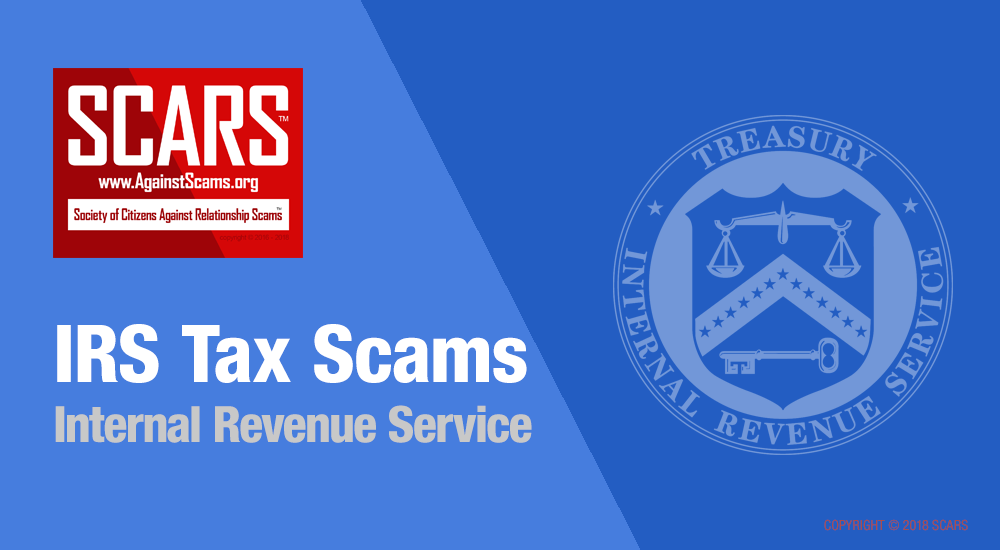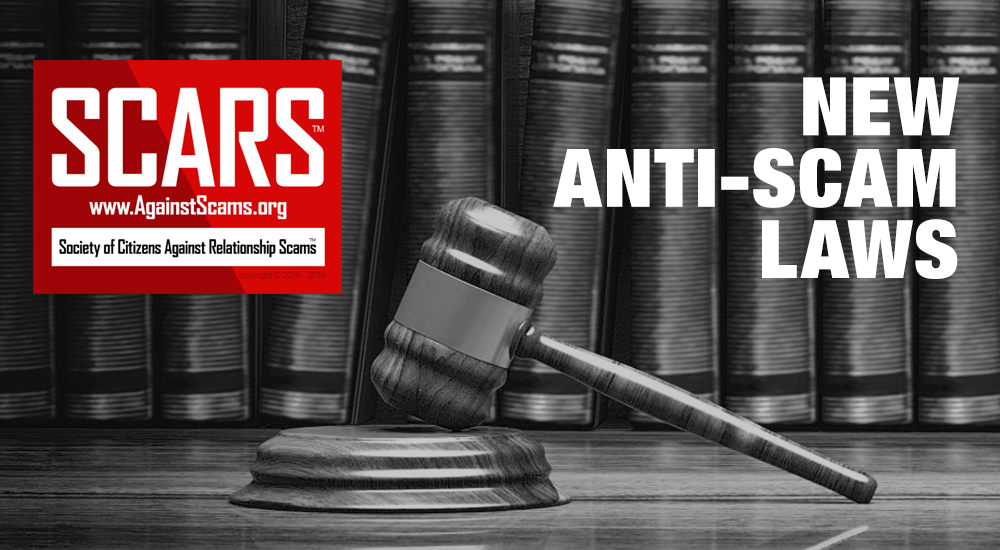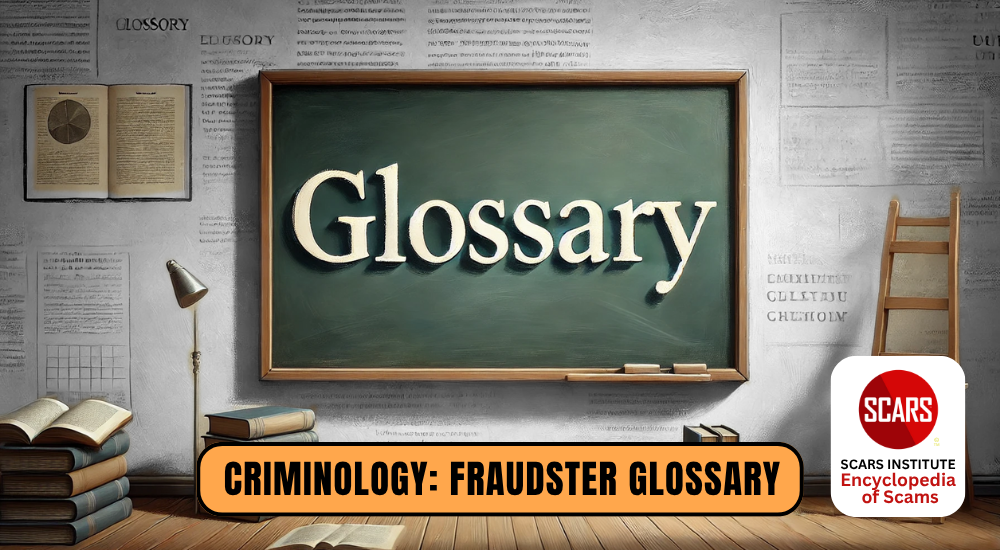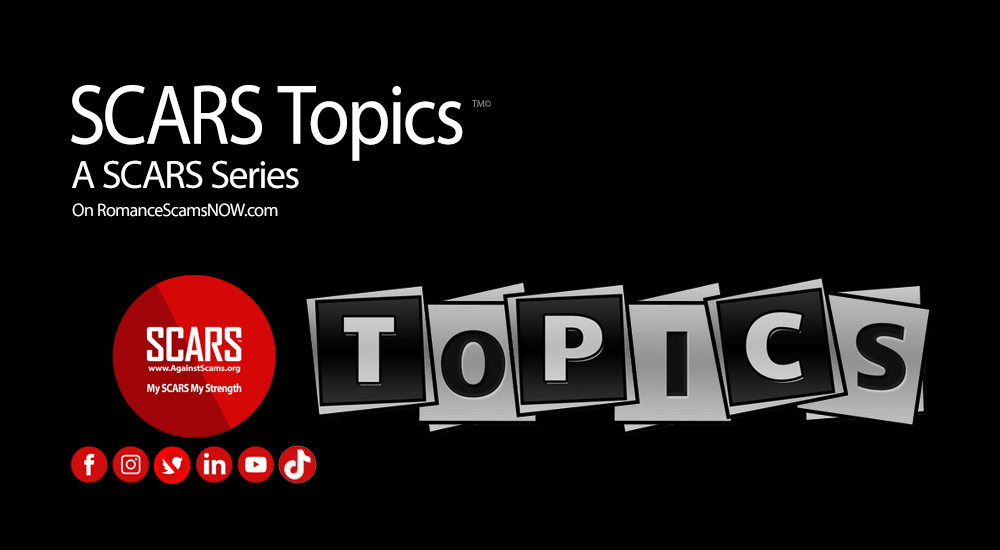
SCARS Institute’s Encyclopedia of Scams™ Published Continuously for 25 Years

Congressional Review: Republican Elder Abuse Prevention and Prosecution Act (EAPPA) Signed by President Trump Bearing Fruit In Stopping Scams
On October 18, 2017, Congress Passed The Elder Abuse Prevention And Prosecution Act (EAPPA) Which Was Signed By President Donal Trump.
The goal of the EAPPA is to address financial abuse and exploitation of elders on a national scale. It is estimated that financial exploitation costs seniors in the U.S. more than $2.9 billion annually (based upon government numbers, but actual amounts are probably 20 to 50 times that number). The crime is scarcely reported with only one in 44 cases reported to authorities, according to congressional testimony. The result is that many victims fail to receive the help they need and their abusers go unpunished. The costs of this crime are often shouldered by the victims’ communities through increased use of government benefits and support so elder abuse prevention is essential to American society.
Scams against the elderly are also bundled under this as well.
Elder financial exploitation covers a broad range of criminal acts perpetrated by individuals and entities, including family members and/or caregivers to strangers. Financial exploitation includes mail, phone and internet-based scams; abuse of fiduciary powers; healthcare fraud; and theft or use of their property without permission. The EAPPA attempts to approach these crimes with comprehensive data, training, and cooperation.
For an example of how this is being applied look at a recent Money Mule arrest in West Virginia »
The goals of the EAPPA are to:
- Improve elder abuse data collection at local, state, and federal levels;
- Improve law enforcement training and technical assistance regarding elder abuse;
- Provide improved victim assistance to victims of elder abuse;
- Improve and support federal prosecution of elder abuse; and
- Create enhanced penalties for those who engage in telemarketing and email scams targeting elders.
The EAPPA seeks to improve elder abuse prevention by addressing some of the issues that contribute to the lack of reporting and prosecution. It addresses the lack of local government and law enforcement training regarding elder abuse crimes; prosecutors’ hesitance in pursuing elder abuse cases; lack of data for government agencies, prosecutors, and law enforcement on elder abuse crimes; and lack of coordination between law enforcement agencies in pursuing elder abuse cases.
The EAPPA expands the federal crime of the use of telephone calls, emails, text messages, or electronic instant messages to solicit, purchase, or participate in schemes that defraud the elderly!
Schemes to defraud targeted by this law include the following scams:
- Buy goods or services
- Romance scams
- Other phone scams
- Enter a contest/sweepstake
- Give charitable donations, gifts or contributions
- Offer/promote Investment
- Offer/promote business opportunities or loans
- Participation in a fraudulent medical study, research study, or pilot study
The law excludes valid or legitimate solicitation through posting, publication or mailing of a catalog/brochure.
Pursuant to the new penalty provisions of the EAPPA, anyone convicted of financial exploitation can lose the equipment used in the crime as well as money and property gained through the crime.
The law requires “the court…order that the defendant forfeits to the United States (1) any property, real or personal, constituting or traceable to gross proceeds obtained from such offense; and (2) any equipment, software, or other technology used or intended to be used to commit or to facilitate the commission of such offense.” This can include cars and real estate property.
The EAPPA also directs the Department of Justice, the Attorney General’s office, and other agencies to work together to “create, compile, evaluate, and disseminate materials and information, and provide the necessary training and technical assistance, to assist states and units of local government in: investigating, prosecuting, pursuing, preventing, understanding, and mitigating the impact of physical, sexual, psychological abuse; exploitation include financial abuse and scams; and “assessing, addressing, and mitigating the physical and psychological trauma to victims of elder abuse.”
Hopefully, with improved local, state, and federal coordination, increased data collection, and more victim assistance at a national level, we will see a significant decline in scams and schemes targeting our elders.
It should be noted that the act was authored by Republican Senator Chuck Grassley of Iowa – thank you Senator Grassley!
S. 178 – The Elder Abuse Prevention and Prosecution Act Key Provisions
The Elder Abuse Prevention and Prosecution Act (EAPPA) would improve the nation’s response to elder abuse and financial exploitation of seniors. It does so by encouraging the investigation and prosecution of perpetrators who prey upon seniors, enhancing data collection, and supporting robust elder abuse prevention programs.
Key Provisions:
- Ensures that at least one Assistant United States Attorney will be designated to serve as Elder Justice Coordinator in each Federal judicial district. (Each Coordinator would prosecute elder abuse cases but also serve as the judicial district’s point-person on these cases.)
- Calls for FBI agents to receive training on the investigation of elder abuse cases.
- Requires the Department of Justice to establish an elder abuse resource group to facilitate information sharing among Federal prosecutors and, more broadly, to support the prosecution of elder abuse cases.
- Ensures that those convicted of financially exploiting seniors through e-mail marketing will be subject to criminal penalties. Mandatory forfeiture and restitution provisions also are included in the legislation.
- Requires the Attorney General’s Advisory Committee, which is comprised of leading U.S. Attorneys from across the country, to establish an elder abuse working group to offer advice to the Attorney General on DOJ’s elder abuse policies and strategies.
- Tasks the Attorney General with publishing best practices for data collection, in consultation with State and local agencies. Also promotes data collection at the Federal level, as the bill directs the Department of Health and Human Services to provide the Department of Justice with its annual statistical data regarding adult protective services investigations and findings in elder abuse cases.
- Supports training and technical assistance for State investigative, prosecutorial, and prevention personnel. Specifically, the Attorney General is charged with creating, compiling, and disseminating materials to State and local agencies regarding the investigation, prosecution, and prevention of elder abuse.
- Authorizes and encourages States to enter into interstate agreements and compacts to collaborate and share resources and expertise in the fight against elder abuse and exploitation.
- Calls for the Attorney General to designate an Elder Justice Coordinator for the entire Justice Department within 60 days of the bill’s enactment. (Among other responsibilities, the Coordinator is expected to enhance DOJ’s understanding, prevention, and detection of, as well as its response to, elder abuse.)
- Requires the chairman of the Federal Trade Commission (FTC) to designate an Elder Justice Coordinator within the FTC’s Bureau of Consumer Protection. (This individual will be responsible for coordinating and supporting the enforcement and consumer education efforts on elder abuse and exploitation.)
- Makes state courts eligible for federal grants to be used to assess the effectiveness, safety, and integrity of adult guardianship and conservatorship proceedings.
TEXT OF PUBLIC LAW NO: 115-70 (10/18/2017)
[115th Congress Public Law 70] [From the U.S. Government Publishing Office] [[Page 1207]] ELDER ABUSE PREVENTION AND PROSECUTION ACT [[Page 131 STAT. 1208]]Public Law 115-70 115th Congress An Act To prevent elder abuse and exploitation and improve the justice system's response to victims in elder abuse and exploitation cases. <<NOTE: Oct. 18, 2017 - [S. 178]>> Be it enacted by the Senate and House of Representatives of the United States of America in Congress assembled, <<NOTE: Elder Abuse Prevention and Prosecution Act. 34 USC 10101 note.>> SECTION 1. SHORT TITLE; TABLE OF CONTENTS. (a) Short Title.--This Act may be cited as the ``Elder Abuse Prevention and Prosecution Act''. (b) Table of Contents.--The table of contents for this Act is as follows: Sec. 1. Short title; table of contents. Sec. 2. Definitions. TITLE I--SUPPORTING FEDERAL CASES INVOLVING ELDER JUSTICE Sec. 101. Supporting Federal cases involving elder justice. TITLE II--IMPROVED DATA COLLECTION AND FEDERAL COORDINATION Sec. 201. Establishment of best practices for local, State, and Federal data collection. Sec. 202. Effective interagency coordination and Federal data collection. TITLE III--ENHANCED VICTIM ASSISTANCE TO ELDER ABUSE SURVIVORS Sec. 301. Sense of the Senate. Sec. 302. Report. TITLE IV--ROBERT MATAVA ELDER ABUSE PROSECUTION ACT OF 2017 Sec. 401. Short title. Sec. 402. Enhanced penalty for telemarketing and email marketing fraud directed at elders. Sec. 403. Training and technical assistance for States. Sec. 404. Interstate initiatives. TITLE V--MISCELLANEOUS Sec. 501. Court-appointed guardianship oversight activities under the Elder Justice Act of 2009. Sec. 502. GAO reports. Sec. 503. Outreach to State and local law enforcement agencies. Sec. 504. Model power of attorney legislation. Sec. 505. Best practices and model legislation for guardianship proceedings. SEC. 2. <<NOTE: 34 USC 21701.>> DEFINITIONS. In this Act-- (1) the terms ``abuse'', ``adult protective services'', ``elder'', ``elder justice'', ``exploitation'', ``law enforcement'', and ``neglect'' have the meanings given those terms in section 2011 of the Social Security Act (42 U.S.C. 1397j); (2) the term ``elder abuse'' includes abuse, neglect, and exploitation of an elder; and [[Page 131 STAT. 1209]] (3) the term ``State'' means each of the several States of the United States, the District of Columbia, the Commonwealth of Puerto Rico, and any other territory or possession of the United States. TITLE I--SUPPORTING FEDERAL CASES INVOLVING ELDER JUSTICE SEC. 101. <<NOTE: Designations. Deadlines. 34 USC 21711.>> SUPPORTING FEDERAL CASES INVOLVING ELDER JUSTICE. (a) Support and Assistance.-- (1) Elder justice coordinators.--The Attorney General shall designate in each Federal judicial district not less than one Assistant United States Attorney to serve as the Elder Justice Coordinator for the district, who, in addition to any other responsibilities, shall be responsible for-- (A) serving as the legal counsel for the Federal judicial district on matters relating to elder abuse; (B) prosecuting, or assisting in the prosecution of, elder abuse cases; (C) conducting public outreach and awareness activities relating to elder abuse; and (D) ensuring the collection of data required to be collected under section 202. (2) <<NOTE: Consultation.>> Investigative support.--The Attorney General, in consultation with the Director of the Federal Bureau of Investigation, shall, with respect to crimes relating to elder abuse, ensure the implementation of a regular and comprehensive training program to train agents of the Federal Bureau of Investigation in the investigation and prosecution of such crimes and the enforcement of laws related to elder abuse, which shall include-- (A) specialized strategies for communicating with and assisting elder abuse victims; and (B) relevant forensic training relating to elder abuse. (3) Resource group.--The Attorney General, through the Executive Office for United States Attorneys, shall ensure the operation of a resource group to facilitate the sharing of knowledge, experience, sample pleadings and other case documents, training materials, and any other resources to assist prosecutors throughout the United States in pursuing cases relating to elder abuse. (4) Designated elder justice working group or subcommittee to the attorney general's advisory committee of united states attorneys <<NOTE: Consultation.>> .--Not later than 60 days after the date of enactment of this Act, the Attorney General, in consultation with the Director of the Executive Office for United States Attorneys, shall establish a subcommittee or working group to the Attorney General's Advisory Committee of United States Attorneys, as established under section 0.10 of title 28, Code of Federal Regulations, or any successor thereto, for the purposes of advising the Attorney General on policies of the Department of Justice relating to elder abuse. (b) Department of Justice Elder Justice Coordinator.--Not later than 60 days after the date of enactment of this Act, the Attorney General shall designate an Elder Justice Coordinator [[Page 131 STAT. 1210]] within the Department of Justice who, in addition to any other responsibilities, shall be responsible for-- (1) coordinating and supporting the law enforcement efforts and policy activities for the Department of Justice on elder justice issues; (2) <<NOTE: Evaluation. Public information.>> evaluating training models to determine best practices and creating or compiling and making publicly available replication guides and training materials for law enforcement officers, prosecutors, judges, emergency responders, individuals working in victim services, adult protective services, social services, and public safety, medical personnel, mental health personnel, financial services personnel, and any other individuals whose work may bring them in contact with elder abuse regarding how to-- (A) <<NOTE: Investigations.>> conduct investigations in elder abuse cases; (B) address evidentiary issues and other legal issues; and (C) <<NOTE: Assessment.>> appropriately assess, respond to, and interact with victims and witnesses in elder abuse cases, including in administrative, civil, and criminal judicial proceedings; and (3) carrying out such other duties as the Attorney General determines necessary in connection with enhancing the understanding, prevention, and detection of, and response to, elder abuse. (c) Federal Trade Commission.-- (1) Federal trade commission elder justice coordinator.--Not later than 60 days after the date of enactment of this Act, the Chairman of the Federal Trade Commission shall designate within the Bureau of Consumer Protection of the Federal Trade Commission an Elder Justice Coordinator who, in addition to any other responsibilities, shall be responsible for-- (A) coordinating and supporting the enforcement and consumer education efforts and policy activities of the Federal Trade Commission on elder justice issues; and (B) serving as, or ensuring the availability of, a central point of contact for individuals, units of local government, States, and other Federal agencies on matters relating to the enforcement and consumer education efforts and policy activities of the Federal Trade Commission on elder justice issues. (2) Reports to congress.--Not later than 1 year after the date of enactment of this Act, and once every year thereafter, the Chairman of the Federal Trade Commission and the Attorney General shall each submit to the Committee on the Judiciary of the Senate and the Committee on the Judiciary of the House of Representatives a report detailing the enforcement actions taken by the Federal Trade Commission and the Department of Justice, respectively, over the preceding year in each case in which not less than one victim was an elder or that involved a financial scheme or scam that was either targeted directly toward or largely affected elders, including-- (A) the name of the district where the case originated; (B) the style of the case, including the case name and number; (C) a description of the scheme or scam; and [[Page 131 STAT. 1211]] (D) the outcome of the case. (d) Use of Appropriated Funds.--No additional funds are authorized to be appropriated to carry out this section. TITLE II--IMPROVED DATA COLLECTION AND FEDERAL COORDINATION SEC. 201. <<NOTE: 34 USC 21721.>> ESTABLISHMENT OF BEST PRACTICES FOR LOCAL, STATE, AND FEDERAL DATA COLLECTION. (a) <<NOTE: Consultation.>> In General.--The Attorney General, in consultation with Federal, State, and local law enforcement agencies, shall-- (1) establish best practices for data collection to focus on elder abuse; and (2) provide technical assistance to State, local, and tribal governments in adopting the best practices established under paragraph (1). (b) <<NOTE: Web posting. Public information.>> Deadline.--Not later than 1 year after the date of enactment of this Act, the Attorney General shall publish the best practices established under subsection (a)(1) on the website of the Department of Justice in a publicly accessible manner. (c) Limitation.--Nothing in this section shall be construed to require or obligate compliance with the best practices established under subsection (a)(1). SEC. 202. <<NOTE: 34 USC 21722.>> EFFECTIVE INTERAGENCY COORDINATION AND FEDERAL DATA COLLECTION. (a) <<NOTE: Consultation. Deadline.>> In General.--The Attorney General, in consultation with the Secretary of Health and Human Services shall, on an annual basis-- (1) collect from Federal law enforcement agencies, other agencies as appropriate, and Federal prosecutors' offices statistical data related to elder abuse cases, including cases or investigations where one or more victims were elders, or the case or investigation involved a financial scheme or scam that was either targeted directly toward or largely affected elders; and (2) <<NOTE: Web posting. Public information.>> publish on the website of the Department of Justice in a publicly accessible manner-- (A) <<NOTE: Summary.>> a summary of the data collected under paragraph (1); and (B) <<NOTE: Recommenda- tions.>> recommendations for collecting additional data relating to elder abuse, including recommendations for ways to improve data reporting across Federal, State, and local agencies. (b) Requirement.--The data collected under subsection (a)(1) shall include-- (1) the total number of investigations initiated by Federal law enforcement agencies, other agencies as appropriate, and Federal prosecutors' offices related to elder abuse; (2) the total number and types of elder abuse cases filed in Federal courts; and (3) for each case described in paragraph (2)-- (A) the name of the district where the case originated; (B) the style of the case, including the case name and number; (C) a description of the act or acts giving rise to the elder abuse; [[Page 131 STAT. 1212]] (D) in the case of a scheme or scam, a description of such scheme or scam giving rise to the elder abuse; (E) information about each alleged perpetrator of the elder abuse; and (F) the outcome of the case. (c) <<NOTE: Deadline.>> HHS Requirement.--The Secretary of Health and Human Services shall, on an annual basis, provide to the Attorney General statistical data collected by the Secretary relating to elder abuse cases investigated by adult protective services, which shall be included in the summary published under subsection (a)(2). (d) Prohibition on Individual Data.--None of the information reported under this section shall include specific individually identifiable data. TITLE III--ENHANCED VICTIM ASSISTANCE TO ELDER ABUSE SURVIVORS SEC. 301. SENSE OF THE SENATE. (a) Findings.--The Senate finds the following: (1) The vast majority of cases of abuse, neglect, and exploitation of older adults in the United States go unidentified and unreported. (2) Not less than $2,900,000,000 is taken from older adults each year due to financial abuse and exploitation. (3) Elder abuse, neglect, and exploitation have no boundaries and cross all racial, social, class, gender, and geographic lines. (4) Older adults who are abused are 3 times more likely to die earlier than older adults of the same age who are not abused. (5) Up to half of all older adults with dementia will experience abuse. (b) Sense of the Senate.--It is the sense of the Senate that-- (1) elder abuse involves the exploitation of potentially vulnerable individuals with devastating physical, mental, emotional, and financial consequences to the victims and their loved ones; (2) to combat this affront to America's older adults, we must do everything possible to both support victims of elder abuse and prevent the abuse from occurring in the first place; and (3) the Senate supports a multipronged approach to prevent elder abuse and exploitation, protect the victims of elder abuse and exploitation from further harm, and bring the perpetrators of such crimes to justice. SEC. 302. <<NOTE: 34 USC 21731.>> REPORT. (a) In General.--Not later than 1 year after the date on which the collection of statistical data under section 202(a)(1) begins and once each year thereafter, the Director of the Office for Victims of Crime shall submit a report to the Committee on the Judiciary of the Senate and the Committee on the Judiciary of the House of Representatives that addresses, to the extent data are available, the nature, extent, and amount of funding under the Victims of Crime Act of 1984 (42 U.S.C. 10601 et seq.) for victims of crime who are elders. [[Page 131 STAT. 1213]] (b) Contents.--The report required under subsection (a) shall include-- (1) <<NOTE: Analysis.>> an analysis of victims' assistance, victims' compensation, and discretionary grants under which elder abuse victims (including elder victims of financial abuse, financial exploitation, and fraud) received assistance; and (2) <<NOTE: Recommenda- tions.>> recommendations for improving services for victims of elder abuse. TITLE IV <<NOTE: Robert Matava Elder Abuse Prosecution Act of 2017.>> -- ROBERT MATAVA ELDER ABUSE PROSECUTION ACT OF 2017 SEC. 401. <<NOTE: 34 USC 10101 note.>> SHORT TITLE. This title may be cited as the ``Robert Matava Elder Abuse Prosecution Act of 2017''. SEC. 402. ENHANCED PENALTY FOR TELEMARKETING AND EMAIL MARKETING FRAUD DIRECTED AT ELDERS. (a) <<NOTE: 18 USC prec. 2325.>> In General.--Chapter 113A of title 18, United States Code, is amended-- (1) in the chapter heading, by inserting ``AND EMAIL MARKETING'' after ``TELEMARKETING''; (2) by striking section 2325 and inserting the following: ``Sec. 2325. <<NOTE: 18 USC 2325.>> Definition ``In this chapter, the term `telemarketing or email marketing'-- ``(1) means a plan, program, promotion, or campaign that is conducted to induce-- ``(A) purchases of goods or services; ``(B) participation in a contest or sweepstakes; ``(C) a charitable contribution, donation, or gift of money or any other thing of value; ``(D) investment for financial profit; ``(E) participation in a business opportunity; ``(F) commitment to a loan; or ``(G) participation in a fraudulent medical study, research study, or pilot study, by use of one or more interstate telephone calls, emails, text messages, or electronic instant messages initiated either by a person who is conducting the plan, program, promotion, or campaign or by a prospective purchaser or contest or sweepstakes participant or charitable contributor, donor, or investor; and ``(2) does not include the solicitation through the posting, publication, or mailing of a catalog or brochure that-- ``(A) contains a written description or illustration of the goods, services, or other opportunities being offered; ``(B) includes the business address of the solicitor; ``(C) includes multiple pages of written material or illustration; and ``(D) has been issued not less frequently than once a year, if the person making the solicitation does not solicit customers by telephone, email, text message, or electronic instant message, but only receives interstate telephone calls, emails, text messages, or electronic instant messages initiated by customers [[Page 131 STAT. 1214]] in response to the written materials, whether in hard copy or digital format, and in response to those interstate telephone calls, emails, text messages, or electronic instant messages does not conduct further solicitation.''; (3) in section 2326, <<NOTE: 18 USC 2326.>> in the matter preceding paragraph (1)-- (A) by striking ``or 1344'' and inserting ``1344, or 1347 or section 1128B of the Social Security Act (42 U.S.C. 1320a-7b)''; and (B) by inserting ``or email marketing'' after ``telemarketing''; and (4) by adding at the end the following: ``Sec. 2328. <<NOTE: 18 USC 2328.>> Mandatory forfeiture ``(a) <<NOTE: Courts.>> In General.--The court, in imposing sentence on a person who is convicted of any offense for which an enhanced penalty is provided under section 2326, shall order that the defendant forfeit to the United States-- ``(1) any property, real or personal, constituting or traceable to gross proceeds obtained from such offense; and ``(2) any equipment, software, or other technology used or intended to be used to commit or to facilitate the commission of such offense. ``(b) <<NOTE: Applicability.>> Procedures.--The procedures set forth in section 413 of the Controlled Substances Act (21 U.S.C. 853), other than subsection (d) of that section, and in Rule 32.2 of the Federal Rules of Criminal Procedure, shall apply to all stages of a criminal forfeiture proceeding under this section.''. (b) Technical and Conforming Amendments.-- (1) The table of chapters at the beginning of part I of title 18, United States Code, <<NOTE: 18 USC prec. 1.>> is amended by striking the item relating to chapter 113A and inserting the following: ``113A. Telemarketing and email marketing fraud..................2325''. (2) The table of sections for chapter 113A of title 18, United States Code, <<NOTE: 18 USC prec. 2325.>> is amended by inserting after the item relating to section 2327 the following: ``2328. Mandatory forfeiture.''. SEC. 403. <<NOTE: 34 USC 21741.>> TRAINING AND TECHNICAL ASSISTANCE FOR STATES. The <<NOTE: Consultation. Coordination. Evaluation.>> Attorney General, in consultation with the Secretary of Health and Human Services and in coordination with the Elder Justice Coordinating Council (established under section 2021 of the Social Security Act (42 U.S.C. 1397k)), shall create, compile, evaluate, and disseminate materials and information, and provide the necessary training and technical assistance, to assist States and units of local government in-- (1) investigating, prosecuting, pursuing, preventing, understanding, and mitigating the impact of-- (A) physical, sexual, and psychological abuse of elders; (B) exploitation of elders, including financial abuse and scams targeting elders; and (C) neglect of elders; and (2) <<NOTE: Assessment.>> assessing, addressing, and mitigating the physical and psychological trauma to victims of elder abuse. [[Page 131 STAT. 1215]] SEC. 404. <<NOTE: 34 USC 21742.>> INTERSTATE INITIATIVES. (a) Interstate Agreements and Compacts.--The consent of Congress is given to any two or more States (acting through State agencies with jurisdiction over adult protective services) to enter into agreements or compacts for cooperative effort and mutual assistance-- (1) in promoting the safety and well-being of elders; and (2) in enforcing their respective laws and policies to promote such safety and well-being. (b) <<NOTE: Consultation. Proposals.>> Recommendations on Interstate Communication.--The Executive Director of the State Justice Institute, in consultation with State or local adult protective services, aging, social, and human services and law enforcement agencies, nationally recognized nonprofit associations with expertise in data sharing among criminal justice agencies and familiarity with the issues raised in elder abuse cases, and the Secretary of Health and Human Services, shall submit to Congress legislative proposals relating to the facilitation of interstate agreements and compacts. TITLE V--MISCELLANEOUS SEC. 501. COURT-APPOINTED GUARDIANSHIP OVERSIGHT ACTIVITIES UNDER THE ELDER JUSTICE ACT OF 2009. Section 2042(c) of the Social Security Act (42 U.S.C. 1397m-1(c)) is amended-- (1) in paragraph (1), by inserting ``(and, in the case of demonstration programs described in paragraph (2)(E), to the highest courts of States)'' after ``States''; (2) in paragraph (2)-- (A) in the matter preceding subparagraph (A), by inserting ``(and the highest courts of States, in the case of demonstration programs described in subparagraph (E))'' after ``local units of government''; (B) in subparagraph (D), by striking ``or'' after the semicolon; (C) by redesignating subparagraph (E) as subparagraph (F); and (D) by inserting after subparagraph (D), the following new subparagraph: ``(E) subject to paragraph (3), programs to assess the fairness, effectiveness, timeliness, safety, integrity, and accessibility of adult guardianship and conservatorship proceedings, including the appointment and the monitoring of the performance of court-appointed guardians and conservators, and to implement changes deemed necessary as a result of the assessments such as mandating background checks for all potential guardians and conservators, and implementing systems to enable the annual accountings and other required conservatorship and guardianship filings to be completed, filed, and reviewed electronically in order to simplify the filing process for conservators and guardians and better enable courts to identify discrepancies and detect fraud and the exploitation of protected persons; or''; (3) by redesignating paragraphs (3), (4), and (5) as paragraphs (4), (5), and (6), respectively; [[Page 131 STAT. 1216]] (4) by inserting after paragraph (2), the following new paragraph: ``(3) Requirements for court-appointed guardianship oversight demonstration programs.-- ``(A) Award of grants.--In awarding grants to the highest courts of States for demonstration programs described in paragraph (2)(E), the Secretary shall consider the recommendations of the Attorney General and the State Justice Institute, as established by section 203 of the State Justice Institute Act of 1984 (42 U.S.C. 10702). ``(B) Collaboration.--The highest court of a State awarded a grant to conduct a demonstration program described in paragraph (2)(E) shall collaborate with the State Unit on Aging for the State and the Adult Protective Services agency for the State in conducting the demonstration program.''; (5) in paragraph (4) (as redesignated by paragraph (3) of this section), by inserting ``(and, in the case of demonstration programs described in paragraph (2)(E), the highest court of a State)'' after ``a State''; and (6) in paragraph (5) (as so redesignated), by inserting ``(or, in the case of demonstration programs described in paragraph (2)(E), the highest court of a State)'' after ``State'' each place it appears. SEC. 502. GAO REPORTS. (a) <<NOTE: Review.>> Elder Justice Recommendations.--Not later than 18 months after the date of enactment of this Act, the Comptroller General of the United States shall review existing Federal programs and initiatives in the Federal criminal justice system relevant to elder justice and shall submit to Congress-- (1) a report on such programs and initiatives; and (2) any recommendations the Comptroller General determines are appropriate to improve elder justice in the United States. (b) Report on Elder Abuse and International Criminal Enterprises.-- Not later than 18 months after the date of enactment of this Act, the Comptroller General of the United States shall submit to Congress a report on-- (1) Federal Government efforts to monitor-- (A) the exploitation of older adults of the United States in global drug trafficking schemes and other international criminal enterprises; (B) the extent to which exploitation of older adults of the United States by international criminal enterprises has resulted in the incarceration of these citizens of the United States in foreign countries; and (C) the total annual number of elder abuse cases pending in the United States; and (2) the results of intervention by the United States with foreign officials on behalf of citizens of the United States who are elder abuse victims in international criminal enterprises. SEC. 503. <<NOTE: Reports.>> OUTREACH TO STATE AND LOCAL LAW ENFORCEMENT AGENCIES. The Attorney General shall submit to the Committee on the Judiciary of the Senate and the Committee on the Judiciary of the House of Representatives a report on efforts by the Department [[Page 131 STAT. 1217]] of Justice to conduct outreach to State and local law enforcement agencies on the process for collaborating with the Federal Government for the purpose of investigating and prosecuting interstate and international elder financial exploitation cases. SEC. 504. <<NOTE: Publication. 34 USC 21751.>> MODEL POWER OF ATTORNEY LEGISLATION. The Attorney General shall publish model power of attorney legislation for the purpose of preventing elder abuse. SEC. 505. <<NOTE: Publication. 34 USC 21752.>> BEST PRACTICES AND MODEL LEGISLATION FOR GUARDIANSHIP PROCEEDINGS. The Attorney General shall publish best practices for improving guardianship proceedings and model legislation relating to guardianship proceedings for the purpose of preventing elder abuse. Approved October 18, 2017.
TAGS: SCARS, Important Article, Information About Scams, Anti-Scam, Scams, Scammers, Fraudsters, Cybercrime, Crybercriminals, Romance Scams, Scam Victims, Congressional Review, Anti-Scam Laws, Republican, Elder Abuse Prevention and Prosecution Act, EAPPA, Signed by President Trump, Stopping Scams
SCARS™ Editorial Team
Society of Citizens Against Relationship Scams Inc.
A Worldwide Crime Victims Assistance Nonprofit Organization
Visit: www.AgainstScams.org
Contact Us: Contact@AgainstScams.org
PLEASE SHARE OUR ARTICLES WITH YOUR FRIENDS & FAMILY
HELP OTHERS STAY SAFE ONLINE – YOUR KNOWLEDGE CAN MAKE THE DIFFERENCE!
The Latest SCARS Posts:
FIND MORE SCAM NEWS
«SCAMCRIME.COM»
JOIN US ON FACEBOOK
«CLICK HERE»
END
MORE INFORMATION
– – –
Tell us about your experiences with Romance Scammers in our
« Scams Discussion Forum on Facebook »
– – –
FAQ: How Do You Properly Report Scammers?
It is essential that law enforcement knows about scams & scammers, even though there is nothing (in most cases) that they can do.
Always report scams involving money lost or where you received money to:
- Local Police – ask them to take an “informational” police report – say you need it for your insurance
- U.S. State Police (if you live in the U.S.) – they will take the matter more seriously and provide you with more help than local police
- Your National Police or FBI « www.IC3.gov »
- The SCARS|CDN™ Cybercriminal Data Network – Worldwide Reporting Network on « www.Anyscam.com »
This helps your government understand the problem, and allows law enforcement to add scammers on watch lists worldwide.
– – –
To learn more about SCARS visit « www.AgainstScams.org »
Please be sure to report all scammers
on « www.Anyscam.com »
Disclaimer:
SCARS IS A DIGITAL PUBLISHER AND DOES NOT OFFER HEALTH OR MEDICAL ADVICE, LEGAL ADVICE, FINANCIAL ADVICE, OR SERVICES THAT SCARS IS NOT LICENSED OR REGISTERED TO PERFORM.
IF YOU’RE FACING A MEDICAL EMERGENCY, CALL YOUR LOCAL EMERGENCY SERVICES IMMEDIATELY, OR VISIT THE NEAREST EMERGENCY ROOM OR URGENT CARE CENTER. YOU SHOULD CONSULT YOUR HEALTHCARE PROVIDER BEFORE FOLLOWING ANY MEDICALLY RELATED INFORMATION PRESENTED ON OUR PAGES.
ALWAYS CONSULT A LICENSED ATTORNEY FOR ANY ADVICE REGARDING LEGAL MATTERS.
A LICENSED FINANCIAL OR TAX PROFESSIONAL SHOULD BE CONSULTED BEFORE ACTING ON ANY INFORMATION RELATING TO YOUR PERSONAL FINANCES OR TAX RELATED ISSUES AND INFORMATION.
This content and other material contained on the website, apps, newsletter, and products (“Content”), is general in nature and for informational purposes only and does not constitute medical, legal, or financial advice; the Content is not intended to be a substitute for licensed or regulated professional advice. Always consult your doctor or other qualified healthcare provider, lawyer, financial or tax professional with any questions you may have regarding the educational information contained herein. SCARS makes no guarantees about the efficacy of information described on or in SCARS’s Content. The information contained are subject to change and are not intended to cover all possible situations or effects. SCARS does not recommend or endorse any specific professional or care provider, product, service, or other information that may be mentioned in SCARS’s websites, apps, and Content unless explicitly identified as such.
The disclaimers herein are provided on this page for ease of reference. These disclaimers supplement and are a part of SCARS’s websites Terms of Use.
Legal Notices:
All original content is Copyright © 1991 – 2020 Society of Citizens Against Relationship Scams Inc. (D.B.A SCARS) All Rights Reserved Worldwide & Webwide. Third-party copyrights acknowledge.
SCARS, SCARS|INTERNATIONAL, SCARS, SCARS|SUPPORT, SCARS, RSN, Romance Scams Now, SCARS|WORLDWIDE, SCARS|GLOBAL, SCARS, Society of Citizens Against Relationship Scams, Society of Citizens Against Romance Scams, SCARS|ANYSCAM, Project Anyscam, Anyscam, SCARS|GOFCH, GOFCH, SCARS|CHINA, SCARS|CDN, SCARS|UK, SCARS|LATINOAMERICA, SCARS|MEMBER, SCARS|VOLUNTEER, SCARS Cybercriminal Data Network, Cobalt Alert, Scam Victims Support Group, are all trademarks of Society of Citizens Against Relationship Scams Inc.
Contact the law firm for the Society of Citizens Against Relationship Scams Incorporated by email at legal@AgainstScams.org
-/ 30 /-
What do you think about this?
Please share your thoughts in a comment below!
Table of Contents
LEAVE A COMMENT?
Recent Comments
On Other Articles
- velma faile on Finally Tax Relief for American Scam Victims is on the Horizon – 2026: “I just did my taxes for 2025 my tax account said so far for romances scam we cd not take…” Feb 25, 19:50
- on Reporting Scams & Interacting With The Police – A Scam Victim’s Checklist [VIDEO]: “Yes, this is a scam. For your own sanity, just block them completely.” Feb 25, 15:37
- on Danielle Delaunay/Danielle Genevieve – Stolen Identity/Stolen Photos – Impersonation Victim UPDATED 2024: “She goes by the name of Sanrda John now” Feb 25, 10:26
- on Reporting Scams & Interacting With The Police – A Scam Victim’s Checklist [VIDEO]: “So far I have not been scam out of any money because I was aware not to give the money…” Feb 25, 07:46
- on Love Bombing And How Romance Scam Victims Are Forced To Feel: “I was love bombed to the point that I would do just about anything for the scammer(s). I was told…” Feb 11, 14:24
- on Dani Daniels (Kira Lee Orsag): Another Scammer’s Favorite: “You provide a valuable service! I wish more people knew about it!” Feb 10, 15:05
- on Danielle Delaunay/Danielle Genevieve – Stolen Identity/Stolen Photos – Impersonation Victim UPDATED 2024: “We highly recommend that you simply turn away form the scam and scammers, and focus on the development of a…” Feb 4, 19:47
- on The Art Of Deception: The Fundamental Principals Of Successful Deceptions – 2024: “I experienced many of the deceptive tactics that romance scammers use. I was told various stories of hardship and why…” Feb 4, 15:27
- on Danielle Delaunay/Danielle Genevieve – Stolen Identity/Stolen Photos – Impersonation Victim UPDATED 2024: “Yes, I’m in that exact situation also. “Danielle” has seriously scammed me for 3 years now. “She” (he) doesn’t know…” Feb 4, 14:58
- on An Essay on Justice and Money Recovery – 2026: “you are so right I accidentally clicked on online justice I signed an agreement for 12k upfront but cd only…” Feb 3, 08:16
ARTICLE META
Important Information for New Scam Victims
- Please visit www.ScamVictimsSupport.org – a SCARS Website for New Scam Victims & Sextortion Victims
- Enroll in FREE SCARS Scam Survivor’s School now at www.SCARSeducation.org
- Please visit www.ScamPsychology.org – to more fully understand the psychological concepts involved in scams and scam victim recovery
If you are looking for local trauma counselors please visit counseling.AgainstScams.org or join SCARS for our counseling/therapy benefit: membership.AgainstScams.org
If you need to speak with someone now, you can dial 988 or find phone numbers for crisis hotlines all around the world here: www.opencounseling.com/suicide-hotlines
A Note About Labeling!
We often use the term ‘scam victim’ in our articles, but this is a convenience to help those searching for information in search engines like Google. It is just a convenience and has no deeper meaning. If you have come through such an experience, YOU are a Survivor! It was not your fault. You are not alone! Axios!
A Question of Trust
At the SCARS Institute, we invite you to do your own research on the topics we speak about and publish, Our team investigates the subject being discussed, especially when it comes to understanding the scam victims-survivors experience. You can do Google searches but in many cases, you will have to wade through scientific papers and studies. However, remember that biases and perspectives matter and influence the outcome. Regardless, we encourage you to explore these topics as thoroughly as you can for your own awareness.
Statement About Victim Blaming
SCARS Institute articles examine different aspects of the scam victim experience, as well as those who may have been secondary victims. This work focuses on understanding victimization through the science of victimology, including common psychological and behavioral responses. The purpose is to help victims and survivors understand why these crimes occurred, reduce shame and self-blame, strengthen recovery programs and victim opportunities, and lower the risk of future victimization.
At times, these discussions may sound uncomfortable, overwhelming, or may be mistaken for blame. They are not. Scam victims are never blamed. Our goal is to explain the mechanisms of deception and the human responses that scammers exploit, and the processes that occur after the scam ends, so victims can better understand what happened to them and why it felt convincing at the time, and what the path looks like going forward.
Articles that address the psychology, neurology, physiology, and other characteristics of scams and the victim experience recognize that all people share cognitive and emotional traits that can be manipulated under the right conditions. These characteristics are not flaws. They are normal human functions that criminals deliberately exploit. Victims typically have little awareness of these mechanisms while a scam is unfolding and a very limited ability to control them. Awareness often comes only after the harm has occurred.
By explaining these processes, these articles help victims make sense of their experiences, understand common post-scam reactions, and identify ways to protect themselves moving forward. This knowledge supports recovery by replacing confusion and self-blame with clarity, context, and self-compassion.
Additional educational material on these topics is available at ScamPsychology.org – ScamsNOW.com and other SCARS Institute websites.
Psychology Disclaimer:
All articles about psychology and the human brain on this website are for information & education only
The information provided in this article is intended for educational and self-help purposes only and should not be construed as a substitute for professional therapy or counseling.
While any self-help techniques outlined herein may be beneficial for scam victims seeking to recover from their experience and move towards recovery, it is important to consult with a qualified mental health professional before initiating any course of action. Each individual’s experience and needs are unique, and what works for one person may not be suitable for another.
Additionally, any approach may not be appropriate for individuals with certain pre-existing mental health conditions or trauma histories. It is advisable to seek guidance from a licensed therapist or counselor who can provide personalized support, guidance, and treatment tailored to your specific needs.
If you are experiencing significant distress or emotional difficulties related to a scam or other traumatic event, please consult your doctor or mental health provider for appropriate care and support.
Also read our SCARS Institute Statement about Professional Care for Scam Victims – click here to go to our ScamsNOW.com website.























Thank you for your comment. You may receive an email to follow up. We never share your data with marketers.